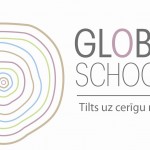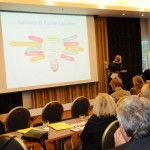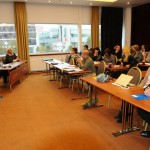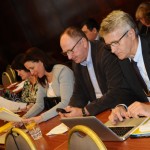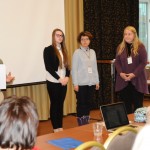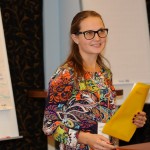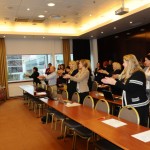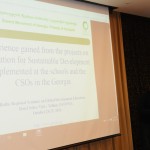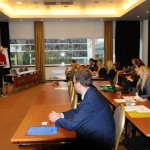Baltic Regional Seminar on Global Education - Call for Cooperation
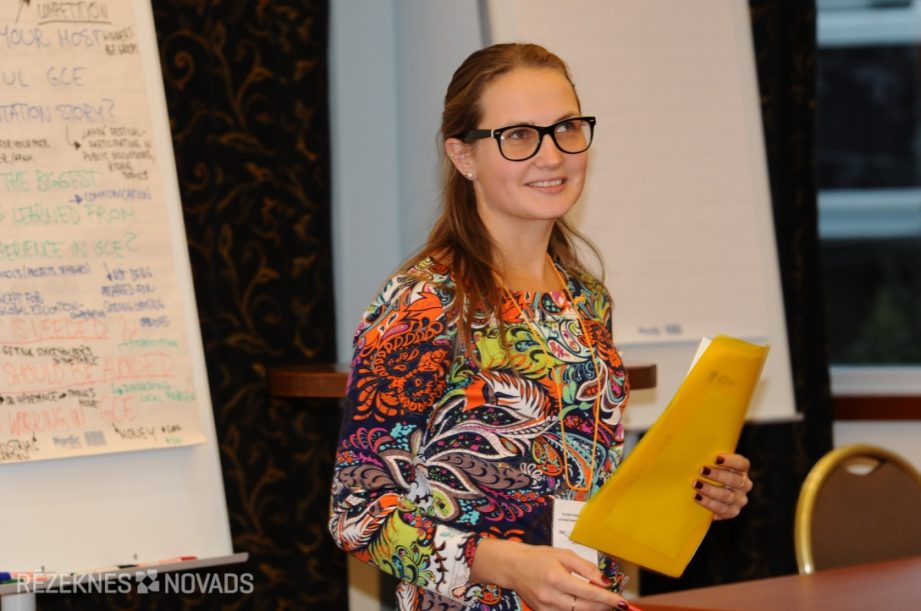
The European Commission's northern/south centre, in cooperation with the Estonian NGO “Eesti People to People”, organised an international seminar for the Baltic States, with the aim of promoting cooperation between the Baltic States in the field of education development and supporting new ideas for cooperation. Representatives of the Balkan countries from Georgia and the Bulgarian NGO sector also participated in the working groups. In the opening of the seminar, representatives of the Baltic State Ministries – from the Lithuanian Ministry of Education Algimantas Šimaitis and the Latvian Foreign Ministry representative Liv Steinberg called for cooperation and wished for a successful work.
The Director of the Centre for Education Development (IAC), Iveta vērse, presented a Latvian Platform for Development Cooperation (PAGES) in the field of global education and Johanna Helina from the Estonian Centre for Global Education (GI), Mondo shared experience of the activities of the Centre. In the seminar, both teachers and academics, representatives of ministries and representatives of non-governmental organisations (NGOs) were invited to identify valuable experience in working groups and jointly plan further work to update global education.
There was an exchange of views on how to link local daily life to global and how to better work with youth audiences in the discussions of the working groups? There were good examples of educating pupils and pupils in educational institutions, while educating parents. However, in order to achieve a change in society's attitudes in these matters, it is necessary to educate society as a whole. Estonian teachers and NGO representatives shared the experience gained through various projects.
The event was attended by representatives of the “global school” project Biruta Rivāne, Santa Nikša-air and Inta Ozolniece, the participants of the seminar were given the opportunity to meet the activities of the Estonian humanana People to People Center and to observe the work performed by people in order to sort the used clothing. This garment comes from Denmark, Sweden and Estonia into a humane shop network, which is distributed in Estonia, Latvia and Lithuania. A large proportion of these cases are sent to Pakistan and some of the money sold in the shops is channelled to starvines in Africa.
Santa Niki-air (working in pre-school) acknowledged that it was very interesting to listen to the experience of other countries and their integration into schools and directly in the activities of teachers, as it is far from easy. Many teachers mainly work and build on the content of curricula and follow and manage lessons. In contrast, teachers who are really important to what is happening in the world will try to teach it to children as well. This type of workshop therefore shows the efforts and the great work that has been made to jointly develop and build teaching tools for teachers, including THE GIFTS.
An interesting example was the Georgian green movement “(representative Levana Tskhakaia), who stressed the importance OF sustainable development and pointed to the use of intellectual ecological problems in learning and working with society. A significant prerequisite FOR successful implementation in society, which was also highlighted in the seminar by Deputy Director of the Lithuanian Centre for Children and Youth, Dalia Navikiene, is the cooperation of ministries in the country, because the fact that we are educating and training only educators is not enough. Attention must be paid to the awareness of the whole public, particularly through mass media. The participants of the seminar acknowledged that this was a great experience, both by expressing their thoughts and proposals in the working group and by developing the preconditions for professional growth and quality assurance of teachers.
Miguel Silva, representative of the European Commission's Northern/Southern Centre, stressed the need for dialogue in society as global education issues affect every one of us. We can preserve our homes for future generations, our land if humanity is able to work together in the field of development cooperation.
UNESCO's representative from Latvia Ilze Dalbina stressed that: 17 Sustainable Development Goals of the National Development Plan it's important to every one of us.
Directly through global education, people can develop their understanding of international development priorities as well as the objectives and principles of sustainable development. It is important to educate themselves and educate others, in the framework of the global school project, COURSES for teachers of the Rēzekne municipality and primary school teachers are successfully managed BY IAC and green freedom lecturers. Maybe someone has to ask why the sustainable development targets are so much, and what can WE do in this global world of the world? You may find answers to your questions in an event organized by Latvian Platform Development Cooperation (PAGES) in collaboration with the Rēzekne municipality's educational administration, 3 November from at 13.00 to 15.00 Rēzekne municipality in the municipal hall, release alley 95a, Rezekne. A documentary “man without impact” will be shown during the event (from Impact to me).
Opinions of the Baltic Regional Seminar participants were compiled by Inta Ozolniece, co-ordinator of the Rēzekne municipality project “Global Schools”
 This project is financed by the support of the European Commission. This publication reflects only the opinions of the author and the Commission cannot be liable for any possible use of the information contained therein.
This project is financed by the support of the European Commission. This publication reflects only the opinions of the author and the Commission cannot be liable for any possible use of the information contained therein.
